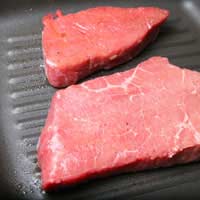Healthy Meat Cookery

Meat is an essential part of a balanced diet for many of us, but there have been several recent scares about E. coli and mad cow disease as well as the increasing awareness of the potential risks to health that come from eating growth hormones and antibiotics used in meat production.
Looking for high quality and humanely raised meat is important, because health and environmental problems come largely from bad hygiene, bad management and overuse of chemical and pharmaceutical products. Meat with an organic label ensures that the animal has been fed an organic feed and raised without antibiotics or growth hormones.
Choosing Meat
When seeking out healthy meat products, lean meat is always the best. For poultry, this means white meat without any skin. Beef cuts that are leanest include chuck and sirloin steaks or tenderloin, while leaner cuts of pork include tenderloin and loin chops. Once you’ve decided on your cut, choose meat with little or no visible fat. Cut all visible fat from the meat before cooking, or if you are cooking poultry, leave the skin on the bird while cooking but remove it before serving.The Risks Of Barbecue Cooking
There are actually three main risks to barbecue cooking. One is eating undercooked meat, which can contain germs like salmonella, E.coli and campylobacter, another is spreading those same bacteria from uncooked meat to food that you’ve already cooked, and finally the increased risk of certain forms of cancer from barbecued meat consumption.In the first case, a meat thermometer helps you be sure barbecued meat is really cooked through, and in the second, two sets of utensils, including barbecue tongs etc: one for cooking meat, the other for lifting cooked meat onto plates, will substantially reduce risk.
In terms of cancer prevention, oolycyclic aromatic hydrocarbons and heterocyclic amines are two forms of carcinogen which are actually created by cooking meat at high temperatures. You have to eat a lot of them to increase your risk, but if you eat barbecued and smoked meat regularly you may wish to reconsider your consumption.
Healthier Cooking Options
Lower fat cooking options can substantially reduce the calorie and saturated fat intake in your meat. As an example, grilling rather than deep frying can halve the calorie content of sausages, while baking burgers rather than shallow frying them removes a quarter of the calories and can reduce the saturated fat intake by a third. The best low fat cooking techniques, in order of healthiness are:- Slow cooking and pressure cooking are great choices as they require no added fat and cook meat so that it is tender. They also require less seasoning such as salt which is something we should all be trying to reduce in our diets.
- Boiling is not a first thought for many of us, but foods such as frankfurters and saveloys can easily be boiled with no loss of taste.
- Grilling has great advantages for meats that already have a reasonable fat content such as sausages and burgers. Many foods that can be grilled can also be baked.
- Roasting on a grill or rack so that fat drips away from the joint can be a healthy option, as long as you drain that fat away and don’t use it to cook your roast potatoes.
- Pot Roasting Chicken in a Slow Cooker
- Meat in the Slow Cooker: Should You Seal It First?
- Meat Stews from Around the World
- Barbecuing Meat: Hints and Tips
- Slow Cooking Pork: Safety Rules and Tasty Recipes
- Slow Cooking Beef and Lamb: Using Cheaper Cuts
- Is It Worth Buying a Meat Thermometer?
- Tips For Meat Barbecues
- Unusual Meats
- How to Cook Different Cuts of Meat
- Vitamins in Meat
- Using Left Over Meat in Your Cookery
- Old Fashioned Meat Dishes
- Respect The Animal - Using the Whole Chicken
- How to Cook the Perfect Steak


Re: Supporting Unpopular Cuts of Meat
Hi, I'm 78 years young and spent all my years consuming the usual 'western' diet. I have various, gut related, issues and,…
Re: Meat in the Slow Cooker: Should You Seal It First?
I read that joints of meat should be 'lifted up' from the bottom of a slow cooker and sat on a bed of…
Re: Meat in the Slow Cooker: Should You Seal It First?
Always seal first! For flavour and appearance, that extra ten or fifteen minutes makes all the…
Re: Slow Cooking Pork: Safety Rules and Tasty Recipes
@Kouki - the pork doesn't have to be cooked before putting it in the pot. The whole idea is to cook…
Re: Slow Cooking Pork: Safety Rules and Tasty Recipes
So, if I leave the crock pot on low setting for 6 hours, raw pork belly should be safe to eat, right?…
Re: How to Cook the Perfect Steak
How is it possible to give a time for cooking when you have not stated how thick the steak is. Surely a 5 cm steak will take…
Re: Modern Slaughter Methods - The Truth
If we are told from an early age that bred animals have no moral value then that is what we grow up believing,our…
Re: Utilising Your Local Butcher
It’s a great idea, and I agree completely. The problem is, if you live in a city now, finding a local butcher. Some neighbourhoods…
Re: Slow Cooking Pork: Safety Rules and Tasty Recipes
Hi I would like to know the temperature for cooking pork meat and sausage please. Many Thanks
Re: Raising Your Own Livestock
Having seen the routine way of slaughtering chickens (stretching the neck between thumb and fingers), wouldn't it be just as humane…